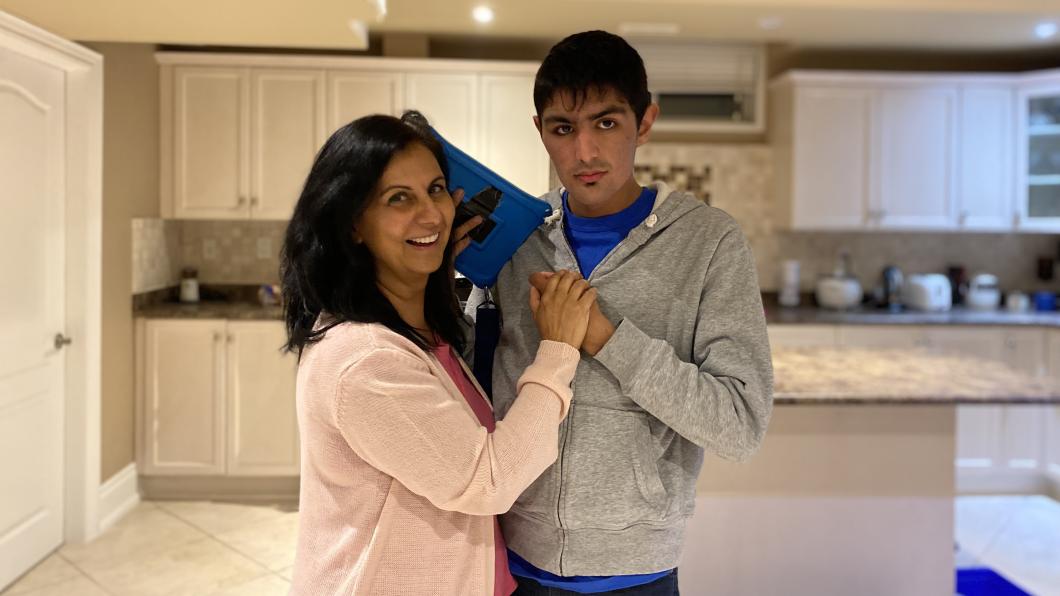
Mindfulness helped mom be kinder to herself. Now she teaches others
Photo of Protibha Gupta with her son Maanav
By Louise Kinross
Protibha Gupta remembers how hard she used to be on herself as a parent to Maanav, 22, who has autism. "I had the stress of whatever I was experiencing as a caregiver and then I'd add on a lot of self-judgment and criticism: 'I'm not trying hard enough. That's why my son is not getting better.'"
That began to shift when she started meditating and practising mindfulness. Years later Protibha took an intensive two-year training program to be certified as a teacher.
"Mindfulness is the ability to be in direct experience with what's happening right now, both externally and internally, without any judgment, and with an attitude of kindness and love and curiosity and trust," Protibha says. "I learned how to become more of my own ally and understand that I deserve lots of compassion, and how to be able to give that to myself."
Protibha's inner world became much more peaceful, she says, and she wanted to share what she'd learned with other parents. "A lot of parents of kids with special needs are so focused outwardly on their child that they don't feel they have time to take care of themselves," Protibha says.
So she began offering a free, eight-week mindfulness meditation program to parents of children with disabilities at Holland Bloorview. The group meets online once a week for an hour to learn meditation, mindfulness and self-compassion.
Sessions involve guided meditations, a talk on a theme like the science of stress, techniques to use at home, and small break-out groups for discussion. Protibha makes her slides and audio meditations available to participants to use at any time.
Mindfulness can be helpful for parents who may find themselves stuck in anxiety about the future, Protibha says. "My son has high needs and I used to get sucked into worrying about what may happen in the future. But I can only exist right now. When I come back to the present moment, it gives me the opening to be okay because my son is okay and I'm okay. It doesn't mean I'm not going to plan for the future, but it means I don't get hijacked by anxiety and fear. Then I'm going to offer myself some compassion and kindness to understand that this is really hard, this is painful. If I recognize that, it becomes a little more bearable."
Protibha says understanding how stress shows up in the body helps parents take things a bit less personally. "Instead of 'I'm an anxious, stressed-out parent who can't do anything right,' there's a recognition of 'Oh, this is what stress feels like. What's happening is there's stress in my body. Okay, I know what do to when there's stress. I'll take a walk, or pick up the phone and call my mom, or have some tea.'"
Protibha says having raised a child with a disability makes it easier to connect empathetically with other parents. "I'm able to tailor what I teach. When I talk about stress I know the stress. When I talk about the inner critic, I tell parents about my own inner critic. I say to my students 'I'm with you. I get it. This is what I did.' They sense my compassion for them is coming from my heart and my life."
Protibha says it's so rewarding to see her students gain new insights. "You'll see something has shifted for them. One student said 'I keep remembering the saying 'thoughts are not facts,' and I keep using that throughout the day.' I'm like yay, that's so amazing. I can see the changes in them and they're so supportive of each other."
Protibha has done two courses at Holland Bloorview and a third is being planned. "Mindfulness gives you options for life, including joyful ones, and the ability to stay balanced even when everything is falling apart," she says. "That's such a gift."
If you're interested in hearing about future mindfulness programs at Holland Bloorview, please e-mail Stephanie at smoynagh@hollandbloorview.ca. Sign up for our monthly BLOOM e-letter and you'll be entered in a draw for some fun prizes! https://bit.ly/3xfj4jc